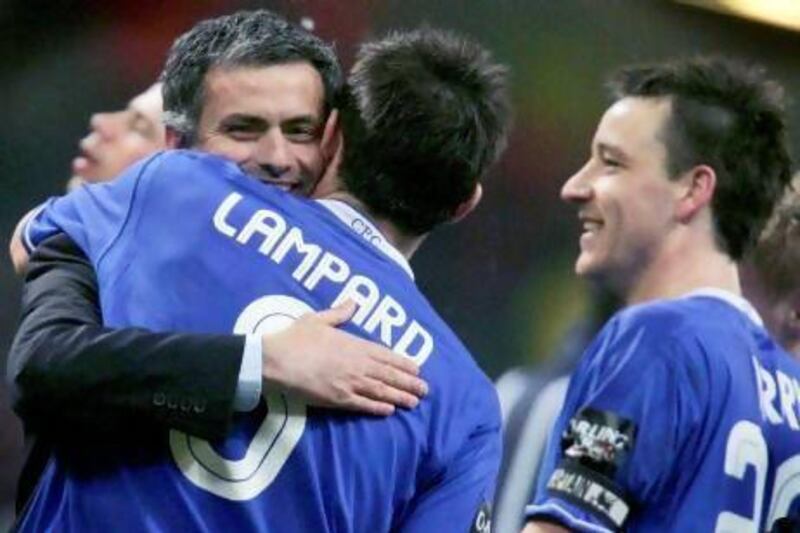It is nine years since Jose Mourinho first swept into Stamford Bridge, proclaiming himself "the Special One" and living up to his own billing. Then, he was the glamorous arriviste at the top table of European management just as Chelsea were the nouveau riche who had infiltrated the aristocrats' private party. For two years, they were perfect for one another.
Now they are reunited, reconciled in part because of a lack of options for either.
There may be love but this is also a marriage of convenience. Owner Roman Abramovich attempted to lure Pep Guardiola to Stamford Bridge, but no matter how much money he offered, the Catalan preferred Bayern Munich. Having exhausted the fund of Champions League-winning managers, the Russian has now begun to employ them for a second time.
Meanwhile, Mourinho, who has won league titles in four countries and the Champions League in two, may be the world's best manager, but he is not the most popular. His divorce from Real Madrid has been messy and marked by sniping on both sides.
That he has hankered after a return to England is clear: whether Stamford Bridge was his dream destination is another matter. Irreverent and mischievous when others were concerned, he was uncharacteristically sycophantic around Sir Alex Ferguson.
Before Manchester United's February meeting with Real Madrid, Paddy Crerand, the 1960s midfielder who became the major pundit for the Premier League champions' television, was surprised to see Mourinho striding across a crowded room to give him an effusive welcome to Spain. Before the return leg, Mourinho granted an exclusive interview to Crerand. The subtext was clear: he had designs on succeeding Ferguson.
The Scot humoured Mourinho and nominated David Moyes as his replacement. So next season's meetings between United and Chelsea acquire an extra spice. The league table has added meaning, too: Moyes has never won the title, whereas Mourinho's motivational powers and quick analytical brain, allied with Chelsea's spending power, enabled him to set a Premier League points record in his debut campaign at Stamford Bridge.
His methods have proved transferable, which, as Mourinho appears the ultimate short-term manager, is just as well. Granting him a four-year deal is optimistic, and not just because of the turnover of managers at Stamford Bridge in the last decade.
Mourinho himself remains the longest to occupy the hot seat in the Abramovich era, lasting three years and 110 days before his departure in September 2007.
That, to put it another way, was almost as long as Avram Grant, Luiz Felipe Scolari, Guus Hiddink, Andre Villas-Boas, Roberto Di Matteo and Rafael Benitez were in charge between them.
All benefited from the team he constructed. It is only in the last couple of years that Chelsea have started to find another blueprint; if Mourinho's game plan was controlled and cautious, Chelsea have reinvented themselves as creative and cavalier. The trophies have kept on coming, but the fact remains that they have only won the league once since his departure, in 2010, and have not mounted a proper challenge in the last three seasons.
Mourinho's task, therefore, is to ally the invention of Oscar, Eden Hazard and Juan Mata with the pragmatism required to render Chelsea more consistent. It is easy to envisage him strengthening the spine of the side; a dominant central defender, authoritative central midfielder and prolific striker should be the priorities.
Like each of his four predecessors, he faces the potential problem of what to do with Fernando Torres. The signing of another of Abramovich's expensive, underachieving favourites, Andriy Shevchenko, marked the beginning of the end for Mourinho in his first spell at Chelsea.
The involvement of technical director Michael Emenalo in transfers is another issue for a manager who long envied Ferguson his dictatorial powers.
Mourinho's CV and popularity with the fan base should give him more clout than his immediate predecessors – not least because his job title does not include the word "interim" – but his bargaining power may have lessened as his star waned a little. He did not fail in Spain, but nor did he quite succeed, either.
His Real won a league title at the expense of perhaps the best team ever, Barcelona, but not the third Champions League he covets.
And so Mourinho's motivation is clear. He is chasing greatness, Chelsea looking for the impetus of immediate success before, inevitably, they part company again.
Follow us
[ @SprtNationalUAE ]






